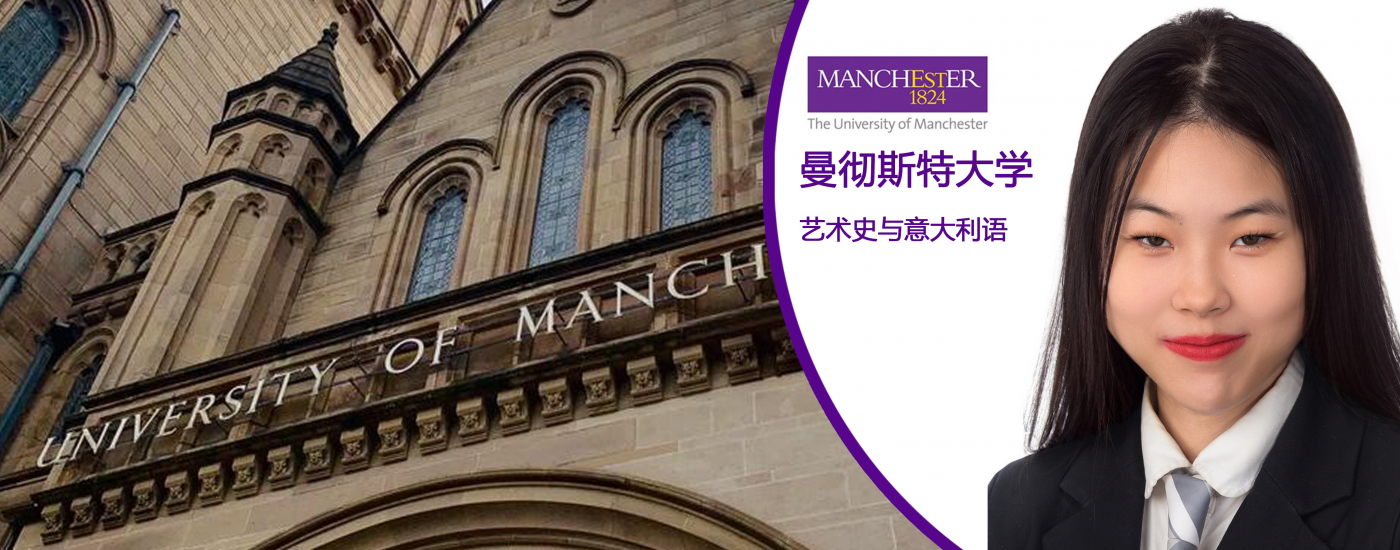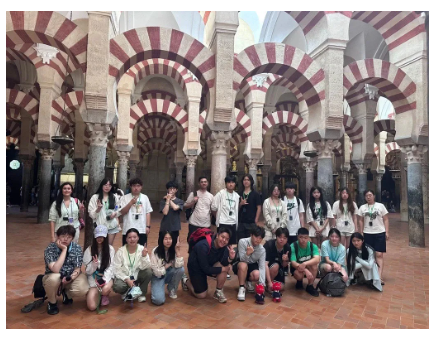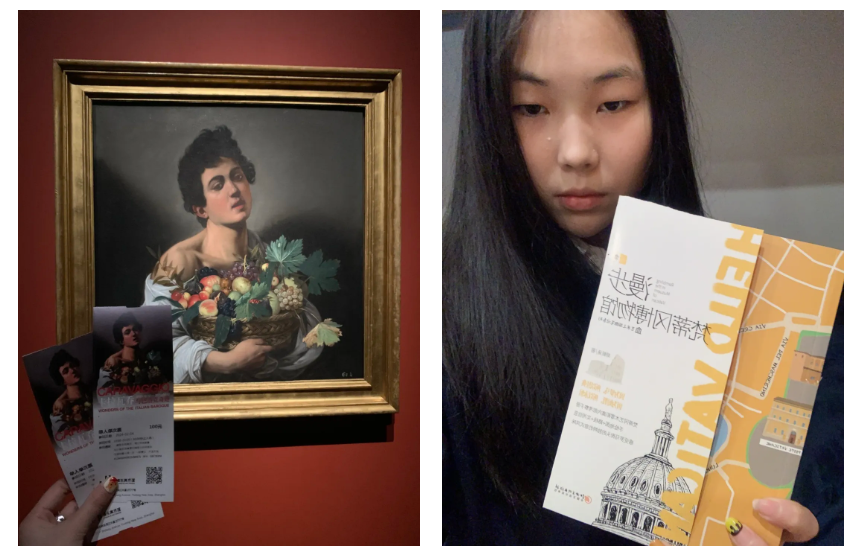Cindy X: Majoring in Art History and Italian

Cindy X has carved her own path toward higher education, selecting Art History and Italian for her studies at the University of Manchester. She is excited to share her application journey, especially considering the niche nature of her majors. How do her personal experiences align with this specialised programme? What prompted her decision? What are her future plans? When selecting the #BestFit university, what factors did she consider? Through sharing her story, she hopes to guide younger students in following their passions when choosing their majors. Today, we interviewed Cindy so she could provide some insight.
Cindy X (Y13)
The University of Manchester- Art History and Italian
University of Leeds - History of art
University of Birmingham - History of art
University of York- History of art with a language(with a year abroad)
UEA- History of art with Gallery & Museum Studies
Q&A
Why Choose Majors in Art History and Italian?
The choice of Art History stems from my family’s academic backgrounds. Both my parents have studied language and history, and when we travel together, we often visit local museums and art galleries. Growing up in this environment ignited my strong interest in Art History from an early age. As I matured, I began actively reading books related to art history and architectural history, benefiting greatly from them. However, what truly solidified my decision to pursue Art History as a future major and career path was the opportunity I had last summer during our school’s trip to Spain. During the trip, I visited some religious buildings such as the Seville Cathedral and the Royal Palace of Madrid, delving into their structures and architecture. This deepened my understanding of Art History, giving me insight and solidifying my decision to pursue this area of study.

As for language, I have shown a natural talent and interest in languages since I was young. After studying Spanish for three years at DHSZ, I conducted in-depth research on the differences and similarities between Romance languages. I found that Spanish and Italian are very similar to a large extent, almost considered two closely related dialects. For example, many pronunciations and spellings in Italian are similar to Spanish. Additionally, Italy has a rich and vibrant culture, including a wealth of artworks such as architecture and sculpture, all closely related to Art History. Therefore, I hope to gain a deeper understanding of Italian culture and art by studying Italian. Thus, it made sense for me to double major in Italian and Art History.

I plan to continue my education after completing my undergraduate degree, pursuing a master's or even a doctoral degree. I aim to focus on fields such as cultural heritage preservation or museum management, as I am deeply interested in collection management in museums and art galleries.

Why choose the University of Manchester?
Firstly, when researching the employment rates of university graduates, I found that the University of Manchester offers abundant internship and employment resources, which will play a significant role in my university career. I learned that Manchester provides each new student with a dedicated mentor and career guidance through Career Services, supporting students' career planning from their first year. Although the major studied in university may not necessarily correlate with future careers directly, I believe it's crucial to begin career planning early in university life, similar to how I started planning my university major when I first entered DHSZ. Additionally, Manchester boasts a vast alumni network and renowned student organisations. I hope to fully utilise these resources and opportunities to better plan my future.
Secondly, in researching the university environment, I was drawn to Manchester's campus facilities. In particular, the renowned John Rylands Library, as well as the nearby Manchester Museum and Manchester Art Gallery, provide convenience for my studies.
Lastly, the University of Manchester has a long history, making it an ideal institution for studying Art History. This year happens to be its 200th anniversary, which aligns with my interests in a school with a long history. I look forward to becoming a part of their legacy.
How DHSZ Supports Your Major Studies?
I founded the Spanish Language and Culture CCA (Co-Curricular Activity) at school. In order to help members better understand Spain, I conducted extensive research beforehand. Through this process, I learned a lot about religion, culture, history, architecture, and various customs, while also discovering commonalities between the cultures of European countries. These experiences were important factors that prompted my decision to study Art History.
I want to express my gratitude to my two Spanish teachers, Mr Gines Bernal and Ms Maria Villaescusa. They provided me with a lot of help with learning Spanish, not only teaching me the grammar and sentence structures I needed to learn but also expanding on aspects of local culture. My favorite part of each class was the lessons on culture, which were very insightful. They also recommended Duolingo as a useful resource. To have conversations, I constantly read books on European history, seeking resonance in our conversations. They can be said to be my guides, greatly reinforcing my choice to study Art History. Even in A2, when we no longer had elective Spanish classes, we still maintained close contact. They are not just teachers, but my friends, and we regularly scheduled time for face-to-face meetings to discuss my learning and interests. I believe that in the future, I will still need their help, especially in further studies and employment. I will cherish the resources and support they provide.

How DHSZ Counselling Team Supports You?
I believe DHSZ's University and College Counselling team is very dedicated and responsible. At every stage of the application process, they provided valuable advice. From initially choosing schools and majors to later polishing personal statements, they offered step-by-step guidance. My personal counsellor, Ms Sophia Chen, and the Head of Counselling, Mr Mark Coyle, have provided immense help to me.
Whether in statements, revisions or school selections, they offered professional advice and analysis, helping me clarify my positions, informing me which schools were more suitable for me, and what my chances of success were. During our Year 12 kick-off event, Mr Coyle once said that although each student is assigned to a specific counsellor, we can actually get support from the entire counselling team. Through my experiences this past year, I definitely found this to be true. Whenever I step into the counselling office, the counsellors always want to know how they can help, offering advice and answering questions. I'm genuinely grateful for our school’s counselling team. Their dedication and support have been invaluable to me.
Your Advice for Lower School Students?
In terms of choosing a major, my advice to lower school students is to start with passion. For myself, my math and physics teachers thought I performed well in these two subjects and suggested I choose a science major. However, the reality is that the teachers may only have seen my math and physics grades, overlooking my excellent performance in humanities. Furthermore, I believe that major selection should be based on passion rather than solely considering grades. It's meaningless to excel in something you don't enjoy. You should choose what you love because only then will you have the motivation to persevere, as passion can overcome great difficulties, and only with motivation can you persevere.
The second piece of advice I would give is to have a reasonable timeline. When you first enter the high school, you may feel lost and unsure of what you want to study in the future. However, this is not a big problem in DHSZ because IGCSEs provide you with opportunities for exploration. You can explore your interests and future areas of study by choosing different courses and participating in various activities and CCAs. However, by A-Levels, you need to gradually determine your direction. Therefore, you should make good use of the resources around you, maintain good relationships with teachers and classmates, and communicate more because they can provide you a solid foundation and more opportunities.






